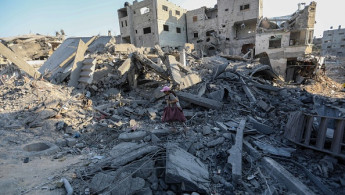Israeli leaders could oppose phased Gaza ceasefire agreement
High-level Israeli politicians could oppose a suggested Gaza ceasefire agreement, fearing it would not be implemented beyond its first phase.
The US proposal would see about 40 out of 129 hostages held in Gaza by Hamas and other groups released in the initial phase, although 34 captives are believed to be dead.
The high-level politicians, who Israeli newspaper Haaretz described on Wednesday as senior security cabinet members, are in favour of reaching an agreement even if it is very costly for Israel.
But the politicians, who do not include far-right ministers Itamar Ben-Gvir and Bezalel Smotrich, contend Israel should potentially demand a one-phase agreement covering all captives who remain alive in Gaza.
A previous week-long truce happened over four months ago, they observed. The pause in fighting, which started in November, included a hostage exchange but left dozens of hostages in the hands of Hamas and other Palestinian groups.
It would probably be more difficult to realise an agreement on a second stage than on the first, saying this would involve troops being held in Gaza.
Talks between Hamas and Israel dragged on, with the Palestinian Islamist group accusing Israel of intransigence while at the same time studying a new ceasefire proposal.
Israeli media reported on Tuesday that Israel was insisting on having a veto allowing it to prevent some Palestinians from being freed as part of a hostage exchange with Hamas.
It comes as the threat of famine looms in Gaza, where Israeli forces have devastated the territory's infrastructure. Hospitals, ambulances, and residential buildings have come under attack.
According to the enclave's health ministry, 33,360 people have been killed and 75,993 injured since the Gaza war began.
The International Court of Justice found in January that Israel was plausibly breaching the UN's Genocide Convention in Gaza.
Israeli Prime Minister Benjamin Netanyahu said on Tuesday: "Our goal is to return the hostages. All the [captured] lookouts, and not only them, all of them together.
"We'll bring them all home."
Sources close to the premier said he does give much significance to threats from Ben-Gvir and Smotrich in the last day.
He believes they will vote in opposition to the developing ceasefire agreement though will not leave government.
Netanyahu has reportedly tried to convince Smotrich to back the deal but not Ben-Gvir, who he believes will be against the agreement under any circumstance.
Sources close to the Likud Party leader said he can accept Ben-Gvir's Jewish Power party and Smotrich's Religious Zionism faction going against the agreement as it does not need their backing to be adopted.
"The only thing that worries Netanyahu is their departure from the government. And our assessment is that this isn't really on the agenda," a source said.
Smotrich had initially made his threat over the fact there had been no full security cabinet meeting to talk about the agreement, though a session was held on Tuesday.
Ben-Gvir had said he would leave government if the Israeli military did not mount an assault on the southern Gazan city of Rafah, where 1.4 million Palestinian civilians have fled from Israeli attacks elsewhere in the strip.
Netanyahu insists the attack on Rafah will take place and that a date had been set for it, but has refused to disclose this date.




 Follow the Middle East's top stories in English at The New Arab on Google News
Follow the Middle East's top stories in English at The New Arab on Google News
![A group of Palestinians, foreign and Israeli activists gather to participated in an olive picking event on the land in the town of Battir, which is under threat of confiscation by Israel in Bethlehem, occupied West Bank on 8 November 2024. [Getty]](/sites/default/files/styles/image_330x185/public/2182930803.jpeg?h=199d8c1f&itok=__0LgGsa)

![People gathered around the rubble of destroyed houses to search for survivors [Getty]](/sites/default/files/styles/image_330x185/public/2024-11/GettyImages-2184733820.jpg?h=199d8c1f&itok=NiM1LO2f)